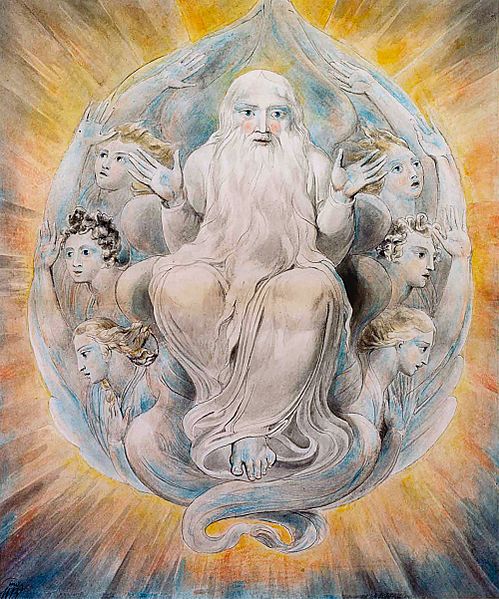 |
New York Public Library Milton Plate 36 |
"Milton's track enters the universes at the intersection of the
eastern globe of Luvah and the southern globe of Urizen and carries
him into the Egg, close to the center of Satan's realm of fire and into
the earth circle - the drawing of this circle is obscured by paint in D
- that fits the smaller end of the egg, with its center marked "Adam." Note that the earth, often overlooked in discussions of this diagram, is wholly within the realm of Urthona (Los), wholly outside of the realm of Urizen, and only fractionally within those of Tharmas and Luvah. (But though Urthona is earth-owner, his realm is not confined to earth. In [copy] D where the spheres are differentiated, his contains most of the blue sky.)"
Here are some of the word pictures from Blake describing the world and Milton's descent into it:
Milton, Plate 19 [21], (E 112)
"All fell towards the Center in dire ruin, sinking down.
And in the South remains a burning fire; in the East a void.
In the West, a world of raging waters; in the North a solid,
Unfathomable! without end. But in the midst of these,
Is built eternally the Universe of Los and Enitharmon:
Towards which Milton went, but Urizen oppos'd his path."
Milton, PLATE 34 [38], (E134)
"Around this Polypus Los continual builds the Mundane Shell
Four Universes round the Universe of Los remain Chaotic
Four intersecting Globes, & the Egg form'd World of Los
In midst; stretching from Zenith to Nadir, in midst of Chaos.
One of these Ruind Universes is to the North named Urthona
One to the South this was the glorious World of Urizen
One to the East, of Luvah: One to the West; of Tharmas.
But when Luvah assumed the World of Urizen in the South
All fell towards the Center sinking downward in dire Ruin
Here in these Chaoses the Sons of Ololon took their abode
In Chasms of the Mundane Shell which open on all sides round
Southward & by the East within the Breach of Miltons descent
To watch the time, pitying & gentle to awaken Urizen
They stood in a dark land of death of fiery corroding waters
Where lie in evil death the Four Immortals pale and cold
And the Eternal Man even Albion upon the Rock of Ages[.]
Seeing Miltons Shadow, some Daughters of Beulah trembling
Returnd, but Ololon remaind before the Gates of the Dead"
Milton, Plate 21 [23], (E 116)
"But saw them not, for the blue Mundane Shell inclosd them in.
And they lamented that they had in wrath & fury & fire
Driven Milton into the Ulro; for now they knew too late
That it was Milton the Awakener: they had not heard the Bard,
Whose song calld Milton to the attempt; and Los heard these
laments.
He heard them call in prayer all the Divine Family;
And he beheld the Cloud of Milton stretching over Europe.
But all the Family Divine collected as Four Suns
In the Four Points of heaven East, West & North & South
Enlarging and enlarging till their Disks approachd each other;
And when they touch'd closed together Southward in One Sun
Over Ololon: and as One Man, who weeps over his brother,
In a dark tomb, so all the Family Divine. wept over Ololon.
Saying, Milton goes to Eternal Death! so saying, they groan'd in
spirit
And were troubled! and again the Divine Family groaned in spirit!
And Ololon said, Let us descend also, and let us give
Ourselves to death in Ulro among the Transgressors."
Milton, PLATE 21 [23] (E 115)
"also all men on Earth,
And all in Heaven, saw in the nether regions of the Imagination
In Ulro beneath Beulah, the vast breach of Miltons descent."
If you are curious about the text on the plate with the diagram, you will find it here:
Milton, Plate 33 [36], (E 132)
"And the Divine Voice was heard in the Songs of Beulah Saying
When I first Married you, I gave you all my whole Soul
I thought that you would love my loves & joy in my delights
Seeking for pleasures in my pleasures O Daughter of Babylon
Then thou wast lovely, mild & gentle. now thou art terrible
In jealousy & unlovely in my sight, because thou hast cruelly
Cut off my loves in fury till I have no love left for thee
Thy love depends on him thou lovest & on his dear loves
Depend thy pleasures which thou hast cut off by jealousy
Therefore I shew my jealousy & set before you Death.
Behold Milton descended to Redeem the Female Shade
From Death Eternal; such your lot, to be continually Redeem'd
By death & misery of those you love & by Annihilation
When the Sixfold Female percieves that Milton annihilates
Himself: that seeing all his loves by her cut off: he leaves
Her also: intirely abstracting himself from Female loves
She shall relent in fear of death: She shall begin to give
Her maidens to her husband: delighting in his delight
And then & then alone begins the happy Female joy
As it is done in Beulah, & thou O Virgin Babylon Mother of Whoredoms
Shalt bring Jerusalem in thine arms in the night watches; and
No longer turning her a wandering Harlot in the streets
Shalt give her into the arms of God your Lord & Husband.
Such are the Songs of Beulah in the Lamentations of Ololon"






